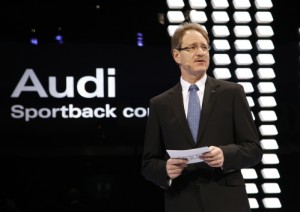
"The industry being redefined." It's also shrinking. Luxury brand sales are off by one-third.
Audi, even though it’s optimistic about its future prospects, hasn’t made any decision yet on whether to build cars at the Volkswagen plant that’s under construction near Chattanooga, Tennessee.
Johan de Nysschen, president of Audi of America, told the Automotive Press Association in Detroit that Audi doesn’t have any plans for using the Chattanooga plant. Audi’s and Volkswagen’s platform strategies are moving in distinctly different directions, making it more difficult to share a plant, he noted.
“We’re not married to a common product with Volkswagen,” he said.
“We haven’t reached any kind of a decision on whether to build cars in (North America),” added de Nysschen. Any final case for a plant in the U.S. would have to consider whether there was enough volume to sustain production and whether it was possible to line up a cost-efficient supply base.
Despite some modest cuts, Audi isn’t about to abandon motorsports, particularly since the company has been well served in recent years by its strong showing at the 24 Hours of LeMans and at the endurance races at Sebring.
This already a tough year since the industry is in the midst of a historic transition, “The industry being redefined,” he said. It’s also shrinking, he said, and more contraction lies ahead.
The luxury segment has already shrunk by one third this year, de Nysschen said.
However, Audi has managed to gain 1.3 points of market between March of 2008 and March of 2009. Public opinion of Audi also is at a record high, according to de Nysschen. The German luxury carmaker also plans to introduce seven new models this year.
The new model list includes a diesel powered Q7 TDI in the second quarter and an A3 TDI during the fourth quarters as well, an S5 and A5 Cabriolets and a new S4. “We know Americans are very skeptical about diesel,” he said. However, he is confident the demands for greater efficiency that are now redefining the market will translate into new sales for Audi.
“Its benefits are here and they’re too great to ignore,” he said. Diesel fuel prices in the U.S. are currently running at a 10-25% premium over gasoline, wiping out the fuel efficiency gains and the additional cost of a diesel. TheDetroitBureau.com has reported about consumer diesel skepticism, where roughly two-thirds of potential buyers will not consider them.
Audi also has avoided using incentives to drive up market share or keep sales from sinking. Lexus, on the other hand, has pushed its incentives up 124%, while Mercedes-Benz have jumped 55% and Infiniti’s have gone up 70% in the past year, according to Audi data. Arch rival BMW actually became the leader in total incentives last year and have pushed up incentives another 15% during the first quarter, he said.
Nevertheless, de Nysschen said he preferred to believe the upturn in car sales will develop sooner rather than later. “There are signs of a very real (economic) pulse out there. About half the Federal Reserve’s Regions are reporting the situation is stabilizing,” he said.
TheDetroitBureau.com has reported that surveys of consumer intent to buy continue to show declines.
Meanwhile, traffic through Audi showrooms is actually up this year by about 8.4% and number of sales leads has increased 67 %. All this is telling us people are deeply interested in cars. They just aren’t ready to take the plunge,” he said. The availability of financing is still an issue and a lot of consumers are holding out for special deals.
